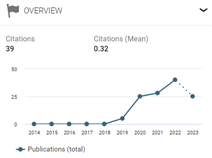Literature review dari randomized controlled trials (RCTs): Pengaruh prebiotik terhadap sistem kekebalan usus penderita diabetes mellitus tipe 2
DOI: 10.30867/gikes.v5i3B.1918Abstract
Background: The gut microbiome, plays a crucial role in maintaining overall health. An imbalance in the microbiome (dysbiosis) can lead to various health issues, including type 2 diabetes. Prebiotics, as nutrients for gut microflora, have the potential to reduce dysbiosis and enhance gut immunity in type 2 diabetes patients. However, there is still limited research on the effects of prebiotics on gut immunity in individuals with type 2 diabetes.
Objectives: To asses the effect of prebiotics on the gut immune system in patients with type 2 diabetes.
Methods: A systematic literature review was conducted using the PRISMA method, including full-text RCT articles from 2014-2024. Databases searched included PubMed, Scopus, MDPI, and Elsevier.
Results: Studies show prebiotics significantly influence gut microbiota composition, especially increasing Bifidobacterium in type 2 diabetes patients, though overall diversity remained unchanged due to short study durations.
Conclusion: Prebiotics enhance gut microbiota, particularly Bifidobacterium, in type 2 diabetes patients. This increase, along with the production of SCFAs, plays a role in lowering gut pH, supporting the growth of beneficial bacteria, and inhibiting pathogens. These findings suggest the potential of prebiotics as part of type 2 diabetes management; however, further research is needed to confirm their clinical application. Healthcare institutions are encouraged to develop educational programs emphasizing the importance of gut microbiota and the role of prebiotics in the health of type 2 diabetes patients.
Keywords
Full Text:
PDFReferences
Daftar Rujukan
Abdulqadir, R., Engers, J., & Al-Sadi, R. (2023). Role of Bifidobacterium in Modulating the Intestinal Epithelial Tight Junction Barrier: Current Knowledge and Perspectives. Current Developments in Nutrition, 7(12), 102026. https://doi.org/10.1016/j.cdnut.2023.102026
Birkeland, E., Gharagozlian, S., Birkeland, K. I., Valeur, J., Måge, I., Rud, I., & Aas, A. M. (2020). Prebiotic effect of inulin-type fructans on faecal microbiota and short-chain fatty acids in type 2 diabetes: a randomised controlled trial. European Journal of Nutrition, 59(7), 3325–3338. https://doi.org/10.1007/s00394-020-02282-5
Cani, P. D. (2018). Human gut microbiome: Hopes, threats and promises. Gut, 67(9), 1716–1725. https://doi.org/10.1136/gutjnl-2018-316723
Delzenne, N. M., Cani, P. D., Everard, A., Neyrinck, A. M., & Bindels, L. B. (2015). Gut microorganisms as promising targets for the management of type 2 diabetes. Diabetologia, 58(10), 2206–2217. https://doi.org/10.1007/s00125-015-3712-7
Dixon, S. A., Mishra, S., Dietsche, K. B., Jain, S., Mabundo, L., Stagliano, M., Krenek, A., Courville, A., Yang, S., Turner, S. A., Meyers, A. G., Estrada, D. E., Yadav, H., & Chung, S. T. (2023). The effects of prebiotics on gastrointestinal side effects of metformin in youth: A pilot randomized control trial in youth-onset type 2 diabetes. Frontiers in Endocrinology, 14(February), 1–13. https://doi.org/10.3389/fendo.2023.1125187
Gonai, M., Shigehisa, A., Kigawa, I., Kurasaki, K., Chonan, O., Matsuki, T., Yoshida, Y., Aida, M., Hamano, K., & Terauchi, Y. (2017). Galacto-oligosaccharides ameliorate dysbiotic Bifidobacteriaceae decline in Japanese patients with type 2 diabetes. Beneficial Microbes, 8(5), 705–716. https://doi.org/10.3920/BM2016.0230
Griffiths, E. A., Duffy, L. C., Schanbacher, F. L., Qiao, H., Dryja, D., Leavens, A., Rossman, J., Rich, G., Dirienzo, D., & Ogra, P. L. (2004). In vivo effects of bifidobacteria and lactoferrin on gut endotoxin concentration and mucosal immunity in Balb/c mice. Digestive Diseases and Sciences, 49(4), 579–589. https://doi.org/10.1023/B:DDAS.0000026302.92898.ae
Kementerian Kesehatan RI. 2018. Hasil Riset Kesehatan Dasar (Riskesdas) 2018. Jakarta: Badan Penelitian dan Pengembangan Kesehatan
Kementerian RI.
Nurmalya Kardina, R., Yuliani, K., & Nuriannisa, F. (2021). Lactobacillus and Bifidobacterium Bacteria Profile in Healthy People and People with Type 2 Diabetes Mellitus. Journal of Health Science and Prevention, 5(1), 33–39. https://doi.org/10.29080/jhsp.v5i1.455
Pedersen, C., Gallagher, E., Horton, F., Ellis, R. J., Ijaz, U. Z., Wu, H., Jaiyeola, E., Diribe, O., Duparc, T., Cani, P. D., Gibson, G. R., Hinton, P., Wright, J., La Ragione, R., & Robertson, M. D. (2016). Host-microbiome interactions in human type 2 diabetes following prebiotic fibre (galacto-oligosaccharide) intake. British Journal of Nutrition, 116(11), 1869–1877. https://doi.org/10.1017/S0007114516004086
Razmpoosh, E., Javadi, A., Ejtahed, H. S., Mirmiran, P., Javadi, M., & Yousefinejad, A. (2019). The effect of probiotic supplementation on glycemic control and lipid profile in patients with type 2 diabetes: A randomized placebo controlled trial. Diabetes and Metabolic Syndrome: Clinical Research and Reviews, 13(1), 175–182. https://doi.org/10.1016/j.dsx.2018.08.008
Sudarmono, P. P. (2016). Mikrobioma: Pemahaman Baru tentang Peran Mikroorganisme dalam Kehidupan Manusia. EJournal Kedokteran Indonesia, 4(2), 71–75. https://doi.org/10.23886/ejki.4.6291.71-5
Tsai, Y. L., Lin, T. L., Chang, C. J., Wu, T. R., Lai, W. F., Lu, C. C., & Lai, H. C. (2019). Probiotics, prebiotics and amelioration of diseases. Journal of Biomedical Science, 26(1), 1–8. https://doi.org/10.1186/s12929-018-0493-6
Refbacks
- There are currently no refbacks.















